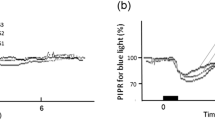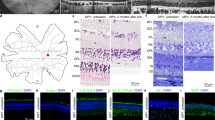Abstract
SOME years ago I found that, on being turned about in the anterio-posterior direction, the inverted rounded lens of an amphibian larva underwent a reverse turn and in a few days came to occupy its previous position1,2.
This is a preview of subscription content, access via your institution
Access options
Subscribe to this journal
Receive 51 print issues and online access
$199.00 per year
only $3.90 per issue
Buy this article
- Purchase on Springer Link
- Instant access to full article PDF
Prices may be subject to local taxes which are calculated during checkout
Similar content being viewed by others
References
Popov, V. V., in Problems of Modern Embryology, 345 (Leningrad Univ. Press, 1956) (in Russian).
Popov, V. V., Bull. (Westnik) Moscow State Univ., Biology, 6, 3 (1960) (in Russian).
Popov, V. V., Dokl. Akad. Nauk U.S.S.R., 137, 192 (1961).
Author information
Authors and Affiliations
Rights and permissions
About this article
Cite this article
POPOV, V. Ray Cataract in the Lens of the Eye caused by Wounding after X-Irradiation. Nature 194, 884–885 (1962). https://doi.org/10.1038/194884a0
Issue Date:
DOI: https://doi.org/10.1038/194884a0
This article is cited by
Comments
By submitting a comment you agree to abide by our Terms and Community Guidelines. If you find something abusive or that does not comply with our terms or guidelines please flag it as inappropriate.



